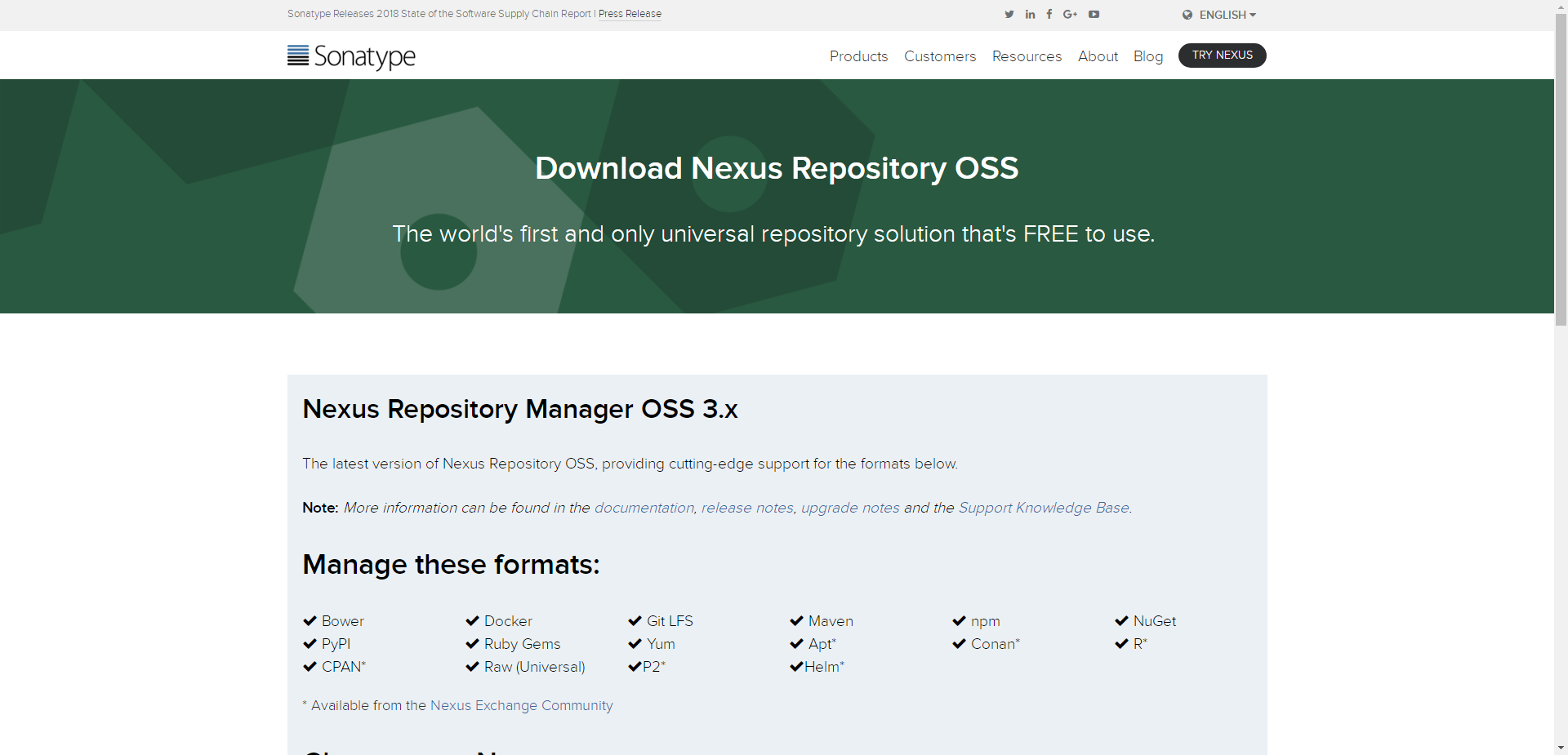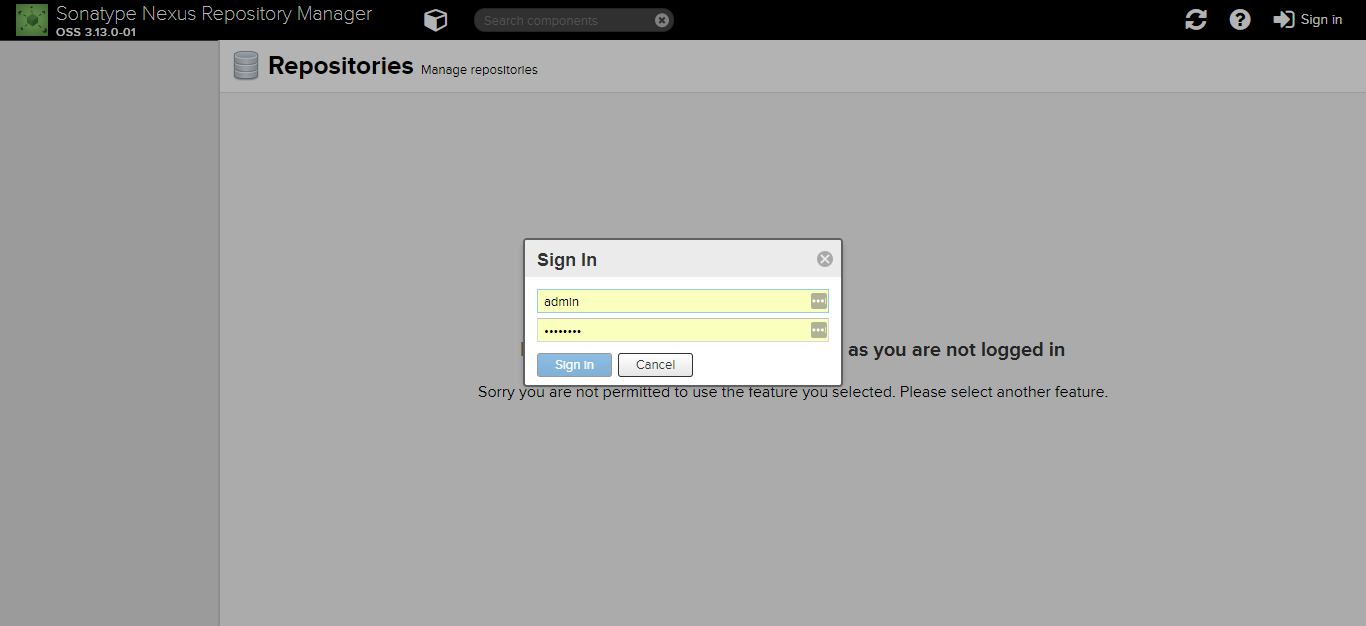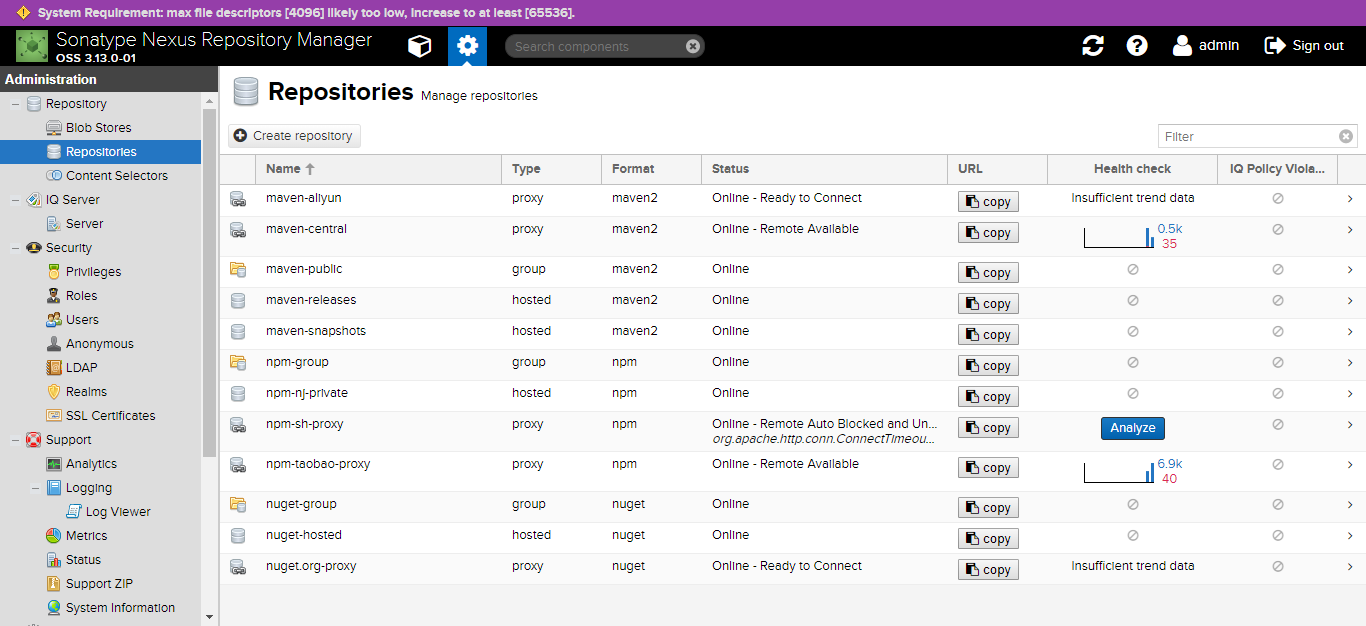5.6 KiB
5.6 KiB
部署并使用 Nexus 作为 Maven 私服
关键词:maven, nexus
部署环境
- Nexus 3.13.0
- JDK 1.8
- Maven 3.5.4
下载安装 Nexus
进入官方下载地址,选择合适版本下载。
本人希望将 Nexus 部署在 Linux 机器,所以选用的是 Unix 版本。
这里,如果想通过命令方式直接下载(比如用脚本安装),可以在官方历史发布版本页面中找到合适版本,然后执行以下命令:
wget -O /opt/maven/nexus-unix.tar.gz http://download.sonatype.com/nexus/3/nexus-3.13.0-01-unix.tar.gz
tar -zxf nexus-unix.tar.gz
解压后,有两个目录:
- nexus-3.13.0-01 - 包含了 Nexus 运行所需要的文件。是 Nexus 运行必须的。
- sonatype-work - 包含了 Nexus 生成的配置文件、日志文件、仓库文件等。当我们需要备份 Nexus 的时候默认备份此目录即可。
启动停止 Nexus
进入 nexus-3.13.0-01/bin 目录,有一个可执行脚本 nexus。
执行 ./nexus,可以查看允许执行的参数,如下所示,含义可谓一目了然:
$ ./nexus
Usage: ./nexus {start|stop|run|run-redirect|status|restart|force-reload}
- 启动 nexus -
./nexus start - 停止 nexus -
启动成功后,在浏览器中访问 http://<ip>:8081,欢迎页面如下图所示:
点击右上角 Sign in 登录,默认用户名/密码为:admin/admin123。
有必要提一下的是,在 Nexus 的 Repositories 管理页面,展示了可用的 maven 仓库,如下图所示:
说明:
- maven-central - maven 中央库(如果没有配置 mirror,默认就从这里下载 jar 包),从 https://repo1.maven.org/maven2/ 获取资源
- maven-releases - 存储私有仓库的发行版 jar 包
- maven-snapshots - 存储私有仓库的快照版(调试版本) jar 包
- maven-public - 私有仓库的公共空间,把上面三个仓库组合在一起对外提供服务,在本地 maven 基础配置 settings.xml 中使用。
使用 Nexus
如果要使用 Nexus,还必须在 settings.xml 和 pom.xml 中配置认证信息。
配置 settings.xml
一份完整的 settings.xml:
<?xml version="1.0" encoding="UTF-8"?>
<settings xmlns="http://maven.apache.org/SETTINGS/1.0.0"
xmlns:xsi="http://www.w3.org/2001/XMLSchema-instance" xsi:schemaLocation="http://maven.apache.org/SETTINGS/1.0.0 http://maven.apache.org/xsd/settings-1.0.0.xsd">
<pluginGroups>
<pluginGroup>org.sonatype.plugins</pluginGroup>
</pluginGroups>
<!-- Maven 私服账号信息 -->
<servers>
<server>
<id>releases</id>
<username>admin</username>
<password>admin123</password>
</server>
<server>
<id>snapshots</id>
<username>admin</username>
<password>admin123</password>
</server>
</servers>
<!-- jar 包下载地址 -->
<mirrors>
<mirror>
<id>public</id>
<mirrorOf>*</mirrorOf>
<url>http://10.255.255.224:8081/repository/maven-public/</url>
</mirror>
</mirrors>
<profiles>
<profile>
<id>zp</id>
<repositories>
<repository>
<id>central</id>
<url>http://central</url>
<releases>
<enabled>true</enabled>
</releases>
<snapshots>
<enabled>true</enabled>
</snapshots>
</repository>
</repositories>
<pluginRepositories>
<pluginRepository>
<id>central</id>
<url>http://central</url>
<releases>
<enabled>true</enabled>
</releases>
<snapshots>
<enabled>true</enabled>
<updatePolicy>always</updatePolicy>
</snapshots>
</pluginRepository>
</pluginRepositories>
</profile>
</profiles>
<activeProfiles>
<activeProfile>zp</activeProfile>
</activeProfiles>
</settings>
配置 pom.xml
在 pom.xml 中添加如下配置:
<distributionManagement>
<repository>
<id>releases</id>
<name>Releases</name>
<url>http://10.255.255.224:8081/repository/maven-releases</url>
</repository>
<snapshotRepository>
<id>snapshots</id>
<name>Snapshot</name>
<url>http://10.255.255.224:8081/repository/maven-snapshots</url>
</snapshotRepository>
</distributionManagement>
注意:
<repository>和<snapshotRepository>的 id 必须和settings.xml配置文件中的<server>标签中的 id 匹配。<url>标签的地址需要和 maven 私服的地址匹配。
执行 maven 构建
如果要使用 settings.xml 中的私服配置,必须通过指定 -P zp 来激活 profile。
示例:
# 编译并打包 maven 项目
$ mvn clean package -Dmaven.skip.test=true -P zp
# 编译并上传 maven 交付件(jar 包)
$ mvn clean deploy -Dmaven.skip.test=true -P zp


